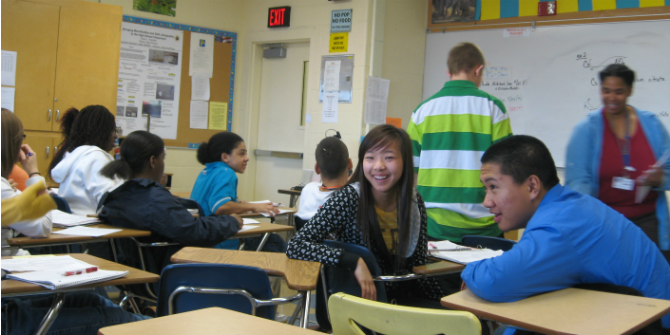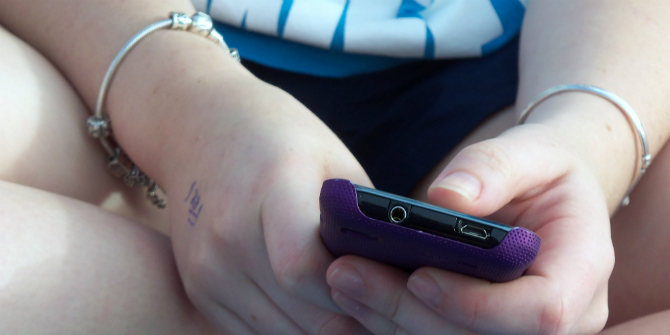 Is it possible to have both privacy and protection of our rights, as digital consumers? Belinha de Abreu discusses the challenges that students, parents and educators in the US are currently facing. Belinha is a media literacy educator in Connecticut. Her research interests include media literacy education, new media, visual and information literacy, and teacher training. Her work particularly focuses on the impact of learning as a result of media and technology consumed by K–12 students. Follow her on Twitter via @belmedia.
Is it possible to have both privacy and protection of our rights, as digital consumers? Belinha de Abreu discusses the challenges that students, parents and educators in the US are currently facing. Belinha is a media literacy educator in Connecticut. Her research interests include media literacy education, new media, visual and information literacy, and teacher training. Her work particularly focuses on the impact of learning as a result of media and technology consumed by K–12 students. Follow her on Twitter via @belmedia.
In US consumer culture, it is increasingly obvious that there is uncertainty and lack of knowledge on the idea of ‘privacy’. Students acknowledge the term, but don’t necessarily know where to draw the line. And the adults in students’ lives share the same struggle. For parents, this issue has become even more difficult when the mode of consumption is the newest technology gadget that their children want or may even need, depending on their academic situation.
The bigger issue is that privacy information when provided on websites or on the purchase of apps is not written for the average citizen, much less a child. And because we want that tool or app, we tend to sign away our rights without knowing or even understanding that our information will most likely be sold to third parties that may then use and misuse our data.
Collecting data by stealth
This technology unease extends to schools and learning, where the idea of privacy is less defined, as school administrators are unaware or ill informed about products used to collect data about their student body under the guise of assessment purposes. This reared its ugly head most recently in the state of New York with a company called InBloom (a non-profit organisation funded by the Gates and Carnegie foundation, whose purpose was to collect testing data). The problem was the way in which data was shared, which included sending student data to third parties not approved by the parents. The company closed down in April 2014.
This incident was the first example of a grassroots effort, led by parents, to combat the way in which student data and privacy is handled at the academic level. Their efforts to stop this group, now termed the ‘opt out’ movement, were successful, and should be highlighted for others in the worldwide community as a model for what can be done when concerns of data breaches are evident.
Data control
Over the past few years I have been studying and following stories such as these to understand the impact of big data in relation to children, the idea of privacy, and the way in which students, parents and educators deal with these issues. This subject is still an open and controversial area for many, whether someone is on the grid completely, or limiting their connections to the online world. In either case, understanding how much information is placed into the spectrum of the web and the idea of what control we have over our data is very much at the forefront of media literacy education, and digital citizenship.
Are students ‘open books’ online? Exposing too much personal information? Some research states that students are aware of their personal data and more proactive about their right to privacy. Common Sense Media is a US organisation that has worked diligently to educate parents and students regarding this issue. Yet there are many breaches of privacy, from the tools used by students and via other consumables, such as department stores and mobile applications.
The ‘right to be forgotten’
Privacy and big data are current concerns propelled by the media choices and mediums used by this generation of young people. Bigger still is that the questions and problems faced today through these technological channels are continuously changing. At the forefront of this discourse most recently are issues related to the ‘right to be forgotten’. While European legislation has given the consumer rights to challenge information that are shared on the internet, in the US this is in the initial stages of debate. The international ripple effect is still being negotiated, with the final stage yet to be determined.
Learning to protect our rights
What is known for now is that privacy and big data are a borderless issue, as is evident by what is transpiring all across Europe regarding Google and the cracking down on data sharing by various governments. It is a concern that continues to need vigilance as well as further study. We increasingly need to consider how to educate our young people on the validity of privacy, but more importantly, that the value of it cannot be dismissed.
Parents must consider how to demonstrate privacy to their children in everyday interactions such as by the way they set passwords, use their credit card information, and when teachable media moments come via the media regarding breaches of data from consumer or banking mishaps. In fact, the question they must ask themselves, and one we, too, must answer, is whether privacy is now a luxury good. As was the topic on CBS News not too long ago, what are we willing to sell or expend in order to keep our information secure? In the US, we are already having discussions about other technologies invading student privacy, such as body cameras in schools.
There must be a point where parents, students and citizens say ‘stop’ and seek change. The ‘right to be forgotten’ change may need to come from legislation, perhaps from our international counterparts who are moving faster to deal with these problems. Moreover, the actual gain may be in further parental grassroots efforts such as the one that caused the InBloom closure, where parents come together to protect the rights of their children, and in doing so, learn how to safeguard themselves.






